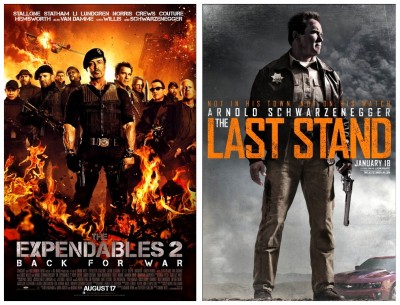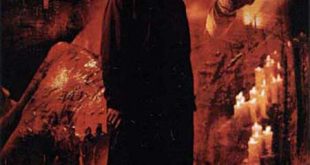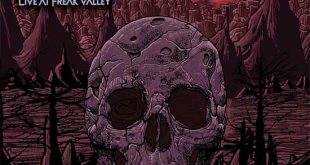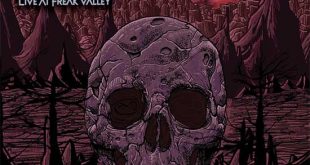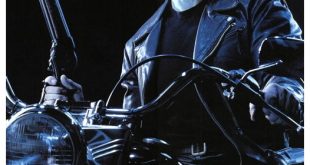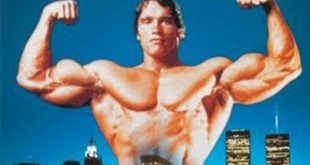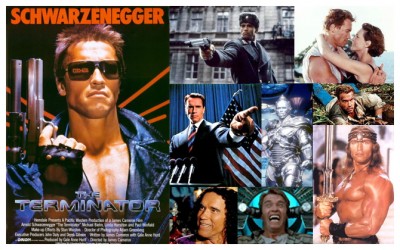 During the eighties a new breed of action star arrived on the world’s big screens. Not so much a hero as an invincible superhero straight from the pages of a comic book, this was the walking embodiment of the old adage ‘Might Is Right’. The crux of his argument was a sword or an uzi, his conversation consisted generally of witty one-liners slapped on the end of violence like exclamation marks. He was a barbarian, a terminator, the Austrian Oak, Arnold Schwarzenegger or, as the world would come to know him, Arnie.
During the eighties a new breed of action star arrived on the world’s big screens. Not so much a hero as an invincible superhero straight from the pages of a comic book, this was the walking embodiment of the old adage ‘Might Is Right’. The crux of his argument was a sword or an uzi, his conversation consisted generally of witty one-liners slapped on the end of violence like exclamation marks. He was a barbarian, a terminator, the Austrian Oak, Arnold Schwarzenegger or, as the world would come to know him, Arnie.
He knew what action audiences wanted and he delivered. “There are a hundred rules for playing a hero. Never blink your eyes when you shoot – you look weak if the noise makes you blink. If you want to show power and anger convincingly, never move your head when you say your lines. John Wayne never moved his head. You can only move your lips – that shows you are ballsy.
Show no emotions. Never skip or hop, you must sprint or take powerful strides. When you are going up or down the stairs, never look at the stairs. When you are loading a gun, do not look at the gun, look at the victim. Practice a hundred times so you can reload without looking. Every gesture has to separate you from the rest of the bunch if you want to play a stud.”
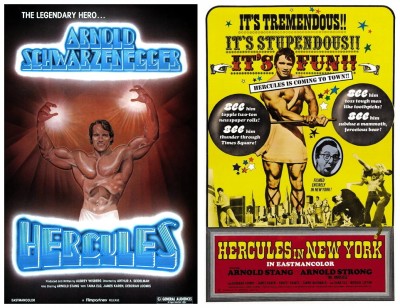 Born on the 30th July 1947 in the small Austrian village of Thal, just outside the town of Graz, Arnold and his older brother Meinhard were raised by their disciplinarian police-chief father, Gustav, and mother Aurelia. Not only were the boys made to exercise rigorously – two hundred knee-bends before breakfast – but essays would have to written after every family field trip. As an escape from his overbearing father, Arnie sought to define himself – physically and psychologically – in the gym.
Born on the 30th July 1947 in the small Austrian village of Thal, just outside the town of Graz, Arnold and his older brother Meinhard were raised by their disciplinarian police-chief father, Gustav, and mother Aurelia. Not only were the boys made to exercise rigorously – two hundred knee-bends before breakfast – but essays would have to written after every family field trip. As an escape from his overbearing father, Arnie sought to define himself – physically and psychologically – in the gym.
Though bodybuilding competitions were viewed as little more than a narcissistic oddity with shades of homo-erotica, Arnie pursued his goal of becoming the best-built man in the world with single-minded determination. Once, when he found the gym closed on a Sunday, he smashed a window and broke in to work out. When his father allowed him only three trips to the gym each week, Arnie built his own gym at home.
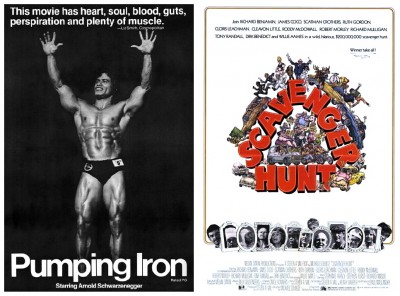 During his mandatory military service in 1965, an eighteen-year-old Arnie went AWOL to compete in the Junior Mister Europe competition in Stuttgard Germany. Exhausted after traveling through the night and with only the clothes on his back, Arnie went on to win with a perfect 300-point score, a feat never before achieved.
During his mandatory military service in 1965, an eighteen-year-old Arnie went AWOL to compete in the Junior Mister Europe competition in Stuttgard Germany. Exhausted after traveling through the night and with only the clothes on his back, Arnie went on to win with a perfect 300-point score, a feat never before achieved.
Returning with his trophy, he was arrested while climbing back over the barracks fence and imprisoned for seven days, after which he was hailed as the company hero and ordered to continue his weights training. After this Arnie left Austria for Germany and London, finally arriving in America in 1969. For him it was the land of opportunity. As well as dominating the international bodybuilding circuit throughout the seventies winning the Mister Universe title seven years running, Arnie became a millionaire before he was thirty through real estate investment and a successful bricklaying business. He met and fell in love with Maria Shriver, a member of the Kennedy clan, in 1977 and he was quick to establish himself as a staunch Republican.
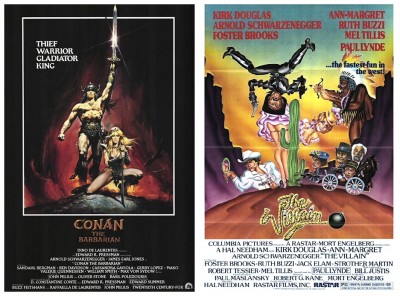 “When I came to this country I was in heaven, because Richard Nixon was president and Reagan was Governor of California. I said, ‘This is great, this is right up my alley’. Acting was an enormous challenge for me. In physical competition I’d had to learn to keep my emotions under control. To discipline myself against my emotions. You almost have to build a wall around yourself, guard your own feelings and the feelings of those around you too, because lows or highs coming at the wrong times can negatively influence how you perform. Well, of course, in acting it’s exactly the opposite. You have to be sensitive to yourself and to those you’re working with. Stay open, keep your defenses down.”
“When I came to this country I was in heaven, because Richard Nixon was president and Reagan was Governor of California. I said, ‘This is great, this is right up my alley’. Acting was an enormous challenge for me. In physical competition I’d had to learn to keep my emotions under control. To discipline myself against my emotions. You almost have to build a wall around yourself, guard your own feelings and the feelings of those around you too, because lows or highs coming at the wrong times can negatively influence how you perform. Well, of course, in acting it’s exactly the opposite. You have to be sensitive to yourself and to those you’re working with. Stay open, keep your defenses down.”
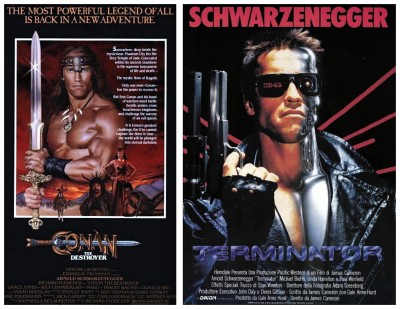 If you guessed that in Arnie’s first film, he played a mythic indestructible figure who rarely spoke and found many occasions to reveal his muscular physique, you’d be right. But Arnie’s first movie was not George Butler‘s seminal weightlifting documentary Pumping Iron (1977), which served as his springboard to Hollywood. And it wasn’t his walk-on as a goonish henchman in The Last Goodbye (1973) either.
If you guessed that in Arnie’s first film, he played a mythic indestructible figure who rarely spoke and found many occasions to reveal his muscular physique, you’d be right. But Arnie’s first movie was not George Butler‘s seminal weightlifting documentary Pumping Iron (1977), which served as his springboard to Hollywood. And it wasn’t his walk-on as a goonish henchman in The Last Goodbye (1973) either.
It wasn’t the little-known film Stay Hungry (1976) in which Sally Field plays a bodybuilder groupie at a gym where Arnie wears a bat-mask while he works out. No, Arnie’s introduction to the medium he would come to dominate with an iron bicep was in the execrable Hercules In New York (1969) sometimes known as Hercules Goes Bananas. It makes his later movies look like masterpieces. Highlights, or should I say low-lights, of his first film include Arnie beating up an escaped grizzly bear – actually a man in a moth-eaten bear suit – and pumping up his accordion-like pectorals one breast at a time in quick succession.
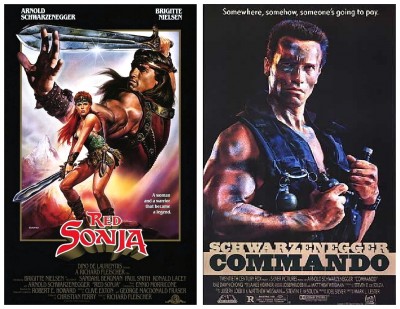 Arnie went from laughable failure in Hercules Goes Bananas to promising success in Bob Rafelson‘s Stay Hungry, which earned him a Golden Globe award for Most Promising Newcomer, but he knew the traditional thespian’s path could only end in disappointment. Arnie told his acting coach Eric Morris, “I don’t really want to be the kind of actor you train people to be. I’m interested in action and adventure, I’m not interested in digging down that deep or taking that route.” After the massively successful documentary Pumping Iron brought Arnie to the attention of a wide movie-going audience, it was only a matter of time before Hollywood found a vehicle for him. Conan The Barbarian (1982) was tailor-made. It relied on stone-faced masculinity and physical bulk, a combination that would define his screen persona. He was an unstoppable force, he was every superhero made flesh. Impossibly muscled, bluntly good looking, seemingly unfettered by intellect or moral qualms other than the most basic wrong-righting and naturally attracted to violence.
Arnie went from laughable failure in Hercules Goes Bananas to promising success in Bob Rafelson‘s Stay Hungry, which earned him a Golden Globe award for Most Promising Newcomer, but he knew the traditional thespian’s path could only end in disappointment. Arnie told his acting coach Eric Morris, “I don’t really want to be the kind of actor you train people to be. I’m interested in action and adventure, I’m not interested in digging down that deep or taking that route.” After the massively successful documentary Pumping Iron brought Arnie to the attention of a wide movie-going audience, it was only a matter of time before Hollywood found a vehicle for him. Conan The Barbarian (1982) was tailor-made. It relied on stone-faced masculinity and physical bulk, a combination that would define his screen persona. He was an unstoppable force, he was every superhero made flesh. Impossibly muscled, bluntly good looking, seemingly unfettered by intellect or moral qualms other than the most basic wrong-righting and naturally attracted to violence.
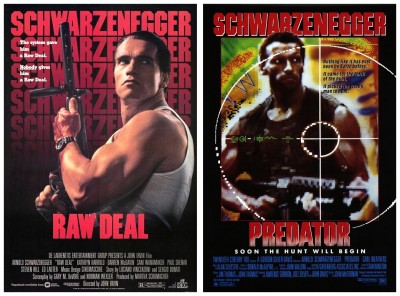 Director John Milius said, “Arnold is the Nietzschean man. There’s something wonderfully primeval about him, harking back to the real basic foundational stuff. Steel and strength and will.”
Director John Milius said, “Arnold is the Nietzschean man. There’s something wonderfully primeval about him, harking back to the real basic foundational stuff. Steel and strength and will.”
But if Pumping Iron introduced him, and Conan The Barbarian set him on the path, it was James Cameron‘s science fiction blockbuster The Terminator (1984) that really delivered Arnie to the world. Though initially cast as the hero, both Arnie and Cameron knew contrary to popular opinion, that it was the villain who’d steal this show. Arnie turned massive firepower into massive star power as the unstoppable Cyberdyne model T-800 and introduced his most famous line to cinematic culture: “I’ll be back.”
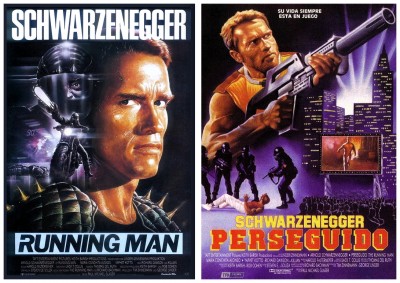 After this, buoyed by his own keen knack for self-publicity, Arnie reached a critical mass that turned him into the action star of the eighties. He had struck on a persona perfectly tailored to his own strengths – action, muscles and steel-eyed glares – and weaknesses – talking. But this suited Arnie perfectly, for whom action, by necessity, had always spoken louder than words. His voice coach Robert Easton said, “Arnie was raised in a rural community, and so when he went into Graz they would laugh at his accent because he had this rural hillbilly dialect. Then he went to Vienna, and everyone there laughed hysterically because he had the Graz dialect. So then he went to Munich, and all the sophisticated Bavarians laughed hysterically at his Viennese dialect. Finally he told me, ‘I came here and everybody laughed’.”
After this, buoyed by his own keen knack for self-publicity, Arnie reached a critical mass that turned him into the action star of the eighties. He had struck on a persona perfectly tailored to his own strengths – action, muscles and steel-eyed glares – and weaknesses – talking. But this suited Arnie perfectly, for whom action, by necessity, had always spoken louder than words. His voice coach Robert Easton said, “Arnie was raised in a rural community, and so when he went into Graz they would laugh at his accent because he had this rural hillbilly dialect. Then he went to Vienna, and everyone there laughed hysterically because he had the Graz dialect. So then he went to Munich, and all the sophisticated Bavarians laughed hysterically at his Viennese dialect. Finally he told me, ‘I came here and everybody laughed’.”
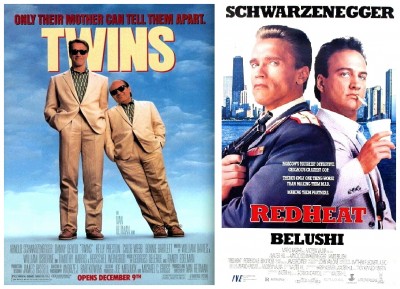 If anything, the strong teutonic accent only helped to establish him in the minds of American audiences as a new breed of hero. During the heady days of eighties Reaganomics and seemingly unstoppable profit, he was the unapologetic super-man playing out America’s hidden fantasies. “In action films where you do the action yourself, you can’t always show emotion. I think the majority of people out there appreciate that.
If anything, the strong teutonic accent only helped to establish him in the minds of American audiences as a new breed of hero. During the heady days of eighties Reaganomics and seemingly unstoppable profit, he was the unapologetic super-man playing out America’s hidden fantasies. “In action films where you do the action yourself, you can’t always show emotion. I think the majority of people out there appreciate that.
They like to be able to disconnect emotions and go after what they want to go after, destroy what they want to destroy. That’s why they go to see those films, it’s a fantasy.” A violent fantasy that was exactly what eighties audiences craved and Arnie delivered better than anyone else in Hollywood. He had a natural attraction to the absurdly violent and Commando (1985) was a prime example.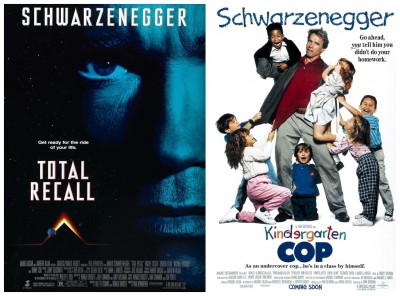
“In one scene I chop a guy’s arm off so, when we’re filming it, the stunt man does something not in the script, he starts to scream. Well, I got the idea to tell him to shut-up and slap his face with the arm I just took off. They thought it was too much. I thought it would be fun. I went to the studio head to argue over including the scene in the film. The guy was in shock, he said it was a sick stupid idea, that no-one’s ever done it before. I told him that was precisely the point, to do something that hadn’t been done before.” But Arnie wasn’t alone in his pursuit of bloody excellence. Sylvester Stallone, who Arnie credits with smoothing the way for muscle-bound heroes, had scored great success with his pumped-up patriot John Rambo. Arnie’s highly-developed sense of competition, honed during his domination of the international bodybuilding circuit, was soon ignited.
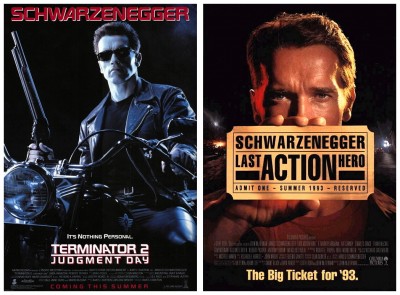 “Stallone uses body doubles for some of the close-ups in his movies. I don’t. One, my ego wouldn’t let me, and two, I don’t need a stand-in because there’s nobody around with a better body than mine. We probably kill more people in Commando than Stallone did in Rambo (1985), but the difference is that we don’t pretend the violence is justified by patriotic pride. All that flag-waving is a lot of bull. We’re all in the entertainment business and, if killing is done with good taste, it can be very entertaining indeed.” Arnie found science fiction the perfect medium for his brand of ultra-violence for its own sake. In Predator (1987) he led a crack platoon against an extraterrestrial on safari, and The Running Man (1987) and Total Recall (1990) cemented his image as the unstoppable hero muscling his way through a dystopian future.
“Stallone uses body doubles for some of the close-ups in his movies. I don’t. One, my ego wouldn’t let me, and two, I don’t need a stand-in because there’s nobody around with a better body than mine. We probably kill more people in Commando than Stallone did in Rambo (1985), but the difference is that we don’t pretend the violence is justified by patriotic pride. All that flag-waving is a lot of bull. We’re all in the entertainment business and, if killing is done with good taste, it can be very entertaining indeed.” Arnie found science fiction the perfect medium for his brand of ultra-violence for its own sake. In Predator (1987) he led a crack platoon against an extraterrestrial on safari, and The Running Man (1987) and Total Recall (1990) cemented his image as the unstoppable hero muscling his way through a dystopian future.
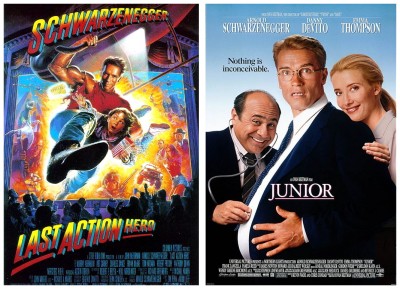 The original screenplay for Total Recall was written by Alien (1979) creators Dan O’Bannon and Ronald Shusett, based on the Philip K. Dick story We Can Remember It For You Wholesale. Producer Dino De Laurentiis took on the project, to be directed by Bruce Beresford starring Richard Dreyfuss, and began pre-production in Queensland, Australia. Unfortunately, when Dino’s Dune (1984) flopped at the box-office, the producer lost all enthusiasm for Total Recall, but the collapse of Dino’s company provided an opening for Arnie, who purchased the film rights for only US$3 million and negotiated a salary of US$10 million plus 15% of the profits, with complete control over the entire production. He had veto power over the producer, director, screenplay, co-stars and promotion, immediately hiring Dutch director Paul Verhoeven, fresh from the blockbuster RoboCop (1987). Total Recall was one of the last major Hollywood blockbusters to make large-scale use of miniature effects rather than computer generated imagery. Only a year later, James Cameron‘s Terminator II Judgment Day (1991), also starring Arnie, prompted a revolution in special effects with its extensive use of CGI.
The original screenplay for Total Recall was written by Alien (1979) creators Dan O’Bannon and Ronald Shusett, based on the Philip K. Dick story We Can Remember It For You Wholesale. Producer Dino De Laurentiis took on the project, to be directed by Bruce Beresford starring Richard Dreyfuss, and began pre-production in Queensland, Australia. Unfortunately, when Dino’s Dune (1984) flopped at the box-office, the producer lost all enthusiasm for Total Recall, but the collapse of Dino’s company provided an opening for Arnie, who purchased the film rights for only US$3 million and negotiated a salary of US$10 million plus 15% of the profits, with complete control over the entire production. He had veto power over the producer, director, screenplay, co-stars and promotion, immediately hiring Dutch director Paul Verhoeven, fresh from the blockbuster RoboCop (1987). Total Recall was one of the last major Hollywood blockbusters to make large-scale use of miniature effects rather than computer generated imagery. Only a year later, James Cameron‘s Terminator II Judgment Day (1991), also starring Arnie, prompted a revolution in special effects with its extensive use of CGI.
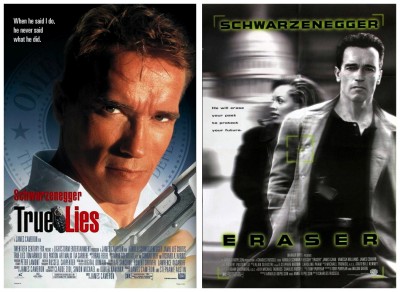 In the nineties he met once again with spectacular success with Terminator II Judgment Day and True Lies (1994), and even more spectacular failure with Last Action Hero (1993) which lost more than US$100 million and nearly bankrupted a studio. Ironically, it was about his time Arnie discovered his talent for comedy, one the most popular films being Junior (1994), the last of three collaborations with director Ivan Reitman and again co-starring Danny DeVito and Pamela Reed. This film brought Arnie his second Golden Globe nomination, this time for Best Actor In A Musical Or Comedy. It was followed by the action thriller Eraser (1996), the Christmas comedy Jingle All The Way (1996) with Arnie in the lead, and the embarrassing Batman And Robin (1997) in which he played Mister Freeze. This was his final film before taking time off to recuperate from a back injury and, following the critical failure of Batman And Robin, Arnie’s film career and box-office prominence went into decline.
In the nineties he met once again with spectacular success with Terminator II Judgment Day and True Lies (1994), and even more spectacular failure with Last Action Hero (1993) which lost more than US$100 million and nearly bankrupted a studio. Ironically, it was about his time Arnie discovered his talent for comedy, one the most popular films being Junior (1994), the last of three collaborations with director Ivan Reitman and again co-starring Danny DeVito and Pamela Reed. This film brought Arnie his second Golden Globe nomination, this time for Best Actor In A Musical Or Comedy. It was followed by the action thriller Eraser (1996), the Christmas comedy Jingle All The Way (1996) with Arnie in the lead, and the embarrassing Batman And Robin (1997) in which he played Mister Freeze. This was his final film before taking time off to recuperate from a back injury and, following the critical failure of Batman And Robin, Arnie’s film career and box-office prominence went into decline.
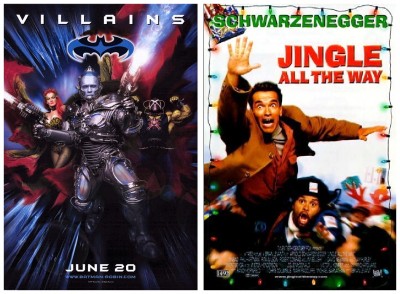 He returned a couple of years later with the supernatural thriller End Of Days (1999), followed by the action films The Sixth Day (2000) and Collateral Damage (2002), both of which failed to do well at the box-office. He made his third appearance as the title character in Terminator III Rise Of The Machines (2003) which went on to earn over US$150 million in America alone. His film appearances after becoming Governor of California include a three-second cameo in The Rundown (2003) aka Welcome To The Jungle alongside Dwayne Johnson aka The Rock, and the comedy remake of Around The World In Eighty Days (2004) where he appeared on-screen with action star Jackie Chan for the very first time. Loosely based on Jules Verne‘s novel, it starred Jackie as Passepartout and Steve Coogan as an eccentric inventor attempting to circumnavigate the globe in eighty days. For comedic reasons, the film intentionally deviated wildly from the novel with anachronisms galore. With production and marketing costs of almost US$150 million, it earned less than US$100 million worldwide, and was declared one of the year’s biggest box-office failures.
He returned a couple of years later with the supernatural thriller End Of Days (1999), followed by the action films The Sixth Day (2000) and Collateral Damage (2002), both of which failed to do well at the box-office. He made his third appearance as the title character in Terminator III Rise Of The Machines (2003) which went on to earn over US$150 million in America alone. His film appearances after becoming Governor of California include a three-second cameo in The Rundown (2003) aka Welcome To The Jungle alongside Dwayne Johnson aka The Rock, and the comedy remake of Around The World In Eighty Days (2004) where he appeared on-screen with action star Jackie Chan for the very first time. Loosely based on Jules Verne‘s novel, it starred Jackie as Passepartout and Steve Coogan as an eccentric inventor attempting to circumnavigate the globe in eighty days. For comedic reasons, the film intentionally deviated wildly from the novel with anachronisms galore. With production and marketing costs of almost US$150 million, it earned less than US$100 million worldwide, and was declared one of the year’s biggest box-office failures.
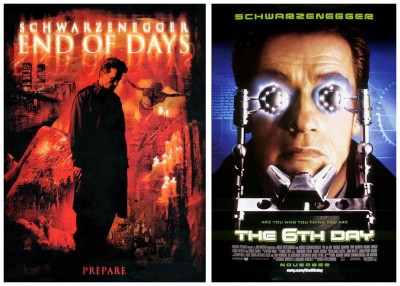 There were rumours going around that Arnie was to make an appearance in Terminator Salvation (2009) as the original T-800 model alongside Austrian bodybuilder Roland Kickinger, but Arnie denied any involvement.
There were rumours going around that Arnie was to make an appearance in Terminator Salvation (2009) as the original T-800 model alongside Austrian bodybuilder Roland Kickinger, but Arnie denied any involvement.
It was later revealed that although he would appear briefly he would not be shooting any new footage, and instead his image was inserted into the movie utilising stock footage from the first film. Arnie made a brief cameo in The Expendables (2010) alongside fellow Planet Hollywood investors Sylvester Stallone and Bruce Willis and, in 2011, just before leaving office as Governor of California.
Arnie announced that he was considering several new scripts for future films, one of them being the World War Two action drama With Wings As Eagles based on a true story written by Randall Wallace. Arnie also revealed that he was being courted for several films, including sequels to The Terminator, Predator and The Running Man, as well as developing a comic superhero character named The Governator with Marvel‘s Stan Lee. More recently Arnie could be spotted in The Expendables II (2012) with more dialogue this time around, and starring in The Last Stand (2013) as a Los Angeles cop-turned-sheriff.
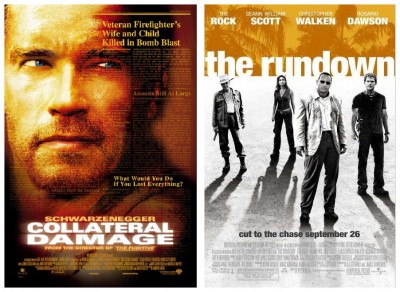 The next time we see Arnie on the silver screen may well be as King Conan in The Legend Of Conan (2014) which will hopefully be directed by John Milius.
The next time we see Arnie on the silver screen may well be as King Conan in The Legend Of Conan (2014) which will hopefully be directed by John Milius.
It seems that Arnie will always be there to say, “I’ll be back.” It’s with this rather threatening phrase I’ll profusely thank Playboy Magazine January 1988 and GQ Magazine May 1990 for assisting my research for this article, and politely ask you to please join me next time when I have another opportunity to present you with more unthinkable realities and unbelievable factoids of the darkest days of cinema, exposing the most daring shriek-and-shudder shock sensations to ever be found in the steaming cesspit known as…Horror News! Toodles!
 Horror News | HNN Official Site | Horror Movies,Trailers, Reviews
Horror News | HNN Official Site | Horror Movies,Trailers, Reviews
